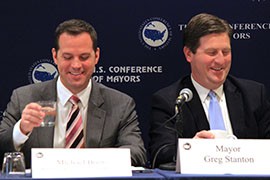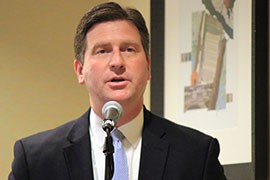- Slug: BC-CNS-Warming Words,500
- Video story available on YouTube
- Photos available (thumbnails, captions below)
By JESSICA BOEHM
Cronkite News
WASHINGTON – Cities are where the “rubber meets the roads” when it comes to confronting climate change, which is why they need to take the lead on the issue, Phoenix Mayor Greg Stanton said Thursday.
Stanton’s remarks came at a session of the U.S. Conference of Mayors winter meeting in Washington, where he led a panel for the conference’s environment committee.
He had invited the panel of experts on climate change to talk to mayors from across the country about how to reduce the effects of global warming and prepare for its “inevitable impacts.”
“Cities and mayors across the country have to take the lead on this issue,” Stanton said. “If we don’t do it, nobody else really will make it effective.”
As White House official Michael Boots outlined the administration’s policy for the mayors, he agreed with Stanton that cities will have to be involved in order to accomplish the goals set forth in President Barack Obama’s plan.
The Climate Action Plan released in June 2013 aimed to cut carbon pollution, make sure communities are prepared for climate change that has already occurred and establish the U.S. as an international leader on the issue, said Boots, a member of the Council on Environmental Quality.
The call for local participation was echoed by A. Stanley Meiburg, acting deputy administrator of the Environmental Protection Agency. He said local governments have direct control over sustainability efforts for infrastructure and water work in their cities.
“This is a societywide effort that everybody has to do their part,” Meiburg said. “This is a marathon, not a sprint. Everyone has to run their leg of the race in the marathon.”
Bob Perciasepe, president of the Center for Climate and Energy Solutions, said that most Americans live in cities and, not coincidentally, the majority of carbon pollution comes from cities. He said mayors “are also in the forefront of … emissions reduction.”
Stanton said he chose climate change as the topic of Thursday’s discussion because it is one of the largest global issues.
Phoenix is already establishing sustainable solutions, he said, in both the alternative fuel and solar energy industries.
But there is more to be done. Stanton said he would like to see the hundreds of thousands of street lights in Phoenix replaced with energy-saving bulbs. This project, like other sustainability efforts, can also create new jobs and boost the Phoenix economy, he said.
“The technology associated with it is really a growth opportunity,” Stanton said.
Stanton said that the impact climate change has on the local, national and global economies is “massive” and that the Phoenix and other local governments need to take the lead on implementing effective solutions.
“I want city of Phoenix to be a leading city on sustainability,” Stanton said.
It’s not only a matter of civic pride – it’s the right thing to do, he said.
“If we don’t do right on this issue, we’re not doing right by my family now and for future generations,” Stanton said.
^__=
Web links:
_ White House Climate Action Plan: http://www.whitehouse.gov/sites/default/files/image/president27sclimateactionplan.pdf
_ Conference of Mayors: http://www.usmayors.org/default_nonmeeting.asp
_ Phoenix Climate Change Page: https://www.phoenix.gov/oep/environment/climate
_ Council on Environmental Equality: http://www.whitehouse.gov/administration/eop/ceq
_ Center for Climate and Energy Solutions: http://www.c2es.org/
_ Environmental Protection Agency: http://www.epa.gov/
^__=
White House official Michael Boots, right, and Phoenix Mayor Greg Stanton discuss climate change at the U.S. Conference of Mayors winter meeting, where Stanton chaired a meeting on the issue. (Cronkite News photo by Jessica Boehm)
Phoenix Mayor Greg Stanton said he convened a group of experts to talk to mayors about what he called the ”inevitable impacts” of climate change. (Cronkite News photo by Jessica Boehm)

